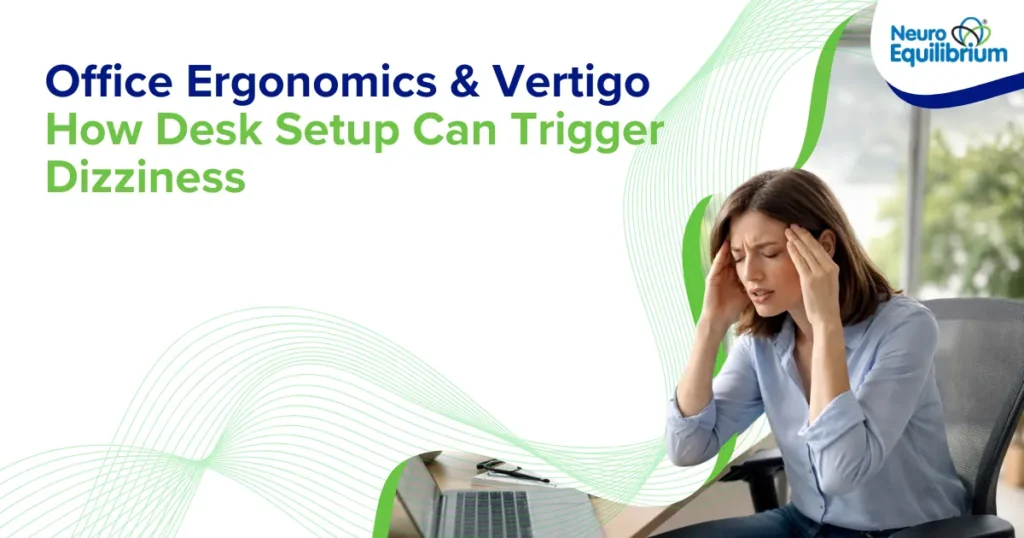People generally do not understand the connection between stress and vertigo. They remain puzzled by the question of whether stress causes vertigo or if vertigo leads to experiencing stress. This is confusing because the relationship between vertigo and stress exists as a complex circular pattern.
Knowledge about the stress-vertigo relationship will help break this loop to identify proper control methods for both conditions.
Know More About Vertigo
- What is Vertigo? Causes, Symptoms, & Treatment
- Beware of Falls: The Importance of Fall Prevention in Elderly
- Vertigo and Balance Disorders in Children
How Stress and Anxiety Can Make Vertigo Worse
Stress and anxiety don’t just make you feel overwhelmed they can also make vertigo symptoms worse. Vertigo is that spinning or dizzy feeling that makes it seem like the room is moving even though you are standing still. If you already experience vertigo, stress, and anxiety can make it feel more intense and more challenging to manage. Here is how it happens:
1. Muscle Tension and Nervous System Response
During stressful or anxious moments, your body automatically engages in tense states—the “fight or flight” response functions as your body’s defensive mechanism by tightening your muscles. The stress makes your nervous system more active. The defensive response leads to adverse effects on vertigo management. The elevated muscle tension that targets your neck and shoulders interferes with the inner ear signals used for balance control. Confused signals can result in additional imbalance between your body and mind.
2. Hyperventilation (Rapid Breathing)
When you are anxious, you might start breathing faster without even realizing it. This is called hyperventilation. Breathing too quickly lowers the amount of carbon dioxide in your blood, which can make you feel lightheaded, dizzy, and even tingly in your hands and feet. If you are already prone to vertigo, this lack of oxygen to the brain and inner ear can make the spinning and imbalance feel even worse.
3. The Vicious Cycle of Stress and Vertigo
Stress and vertigo can feed off each other in a cycle that’s hard to break. Here is how it works:
- You feel stressed → Your muscles tense up, and you start breathing faster
- This triggers dizziness or makes existing vertigo worse
- Feeling dizzy makes you more anxious and worried
- The increased anxiety causes more muscle tension and rapid breathing
- The vertigo then gets even worse
It’s like being stuck in a loop where stress causes vertigo, which in turn causes more stress. This makes it harder for your body to calm down and regain balance.

Stress as a Trigger for Vestibular Migraine
When you have vestibular migraines that lead to vertigo symptoms along with balance issues, the effect of stress intensifies your condition. Symptoms of a vestibular migraine differ from standard migraines since it does not always produce headaches, yet it causes dizziness alongside unsteadiness and sensitivity towards both light and sound stimuli. Stress is one of the most common triggers for these kinds of migraines, and here’s why:
When stress triggers a vestibular migraine, you might experience the following in addition to Vertigo:
- Nausea – Feeling like you are going to throw up
- Sensitivity to light and sound – Bright lights and loud noises might feel irritating and often unbearable
- Unsteadiness – Feeling off-balance, like you might fall
- Difficulty in focusing – this is called brain fog. Have you ever felt like you went to get something and then wonder what you had come for? Having difficulty in multi-tasking?
These symptoms can last minutes or even hours, making it hard to focus on anything else.
Managing Stress to Reduce Vertigo Symptoms
If stress is making your vertigo or migraines worse, there are several simple ways to calm your body and mind:
- Deep Breathing – Deep breathing allows your heart rate to lower while your nervous system relaxes, thus minimizing the occurrence of dizziness.
- Mindfulness and Meditation – The mental practice of staying present reduces anxiety levels in the brain, which protects symptoms from worsening.
- Yoga and Gentle Exercise – Stretching and light movement release tension and improve blood flow to your brain, which can help prevent migraines.Fast head movements can worsen symptoms. Even walking on the treadmill or working out on a cross-trainer can aggravate dizziness. Walking on flat ground is a better way to exercise.
- Sleep and Relaxation – Getting enough sleep and rest helps your brain handle stress better and reduces the chance of vertigo or migraines.
- Vestibular Rehabilitation Therapy (VRT) – This special type of physical therapy helps your brain and inner ear work together better, which can improve balance and reduce dizziness caused by anxiety.The VRT should be customized to the needs of the patient by a physiotherapist trainedin treating dizzy patients.
- Cognitive Behavioral Therapy (CBT) – Working with a trained therapist can help address negative thoughts about vertigo and anxiety, which can break the cycle of stress and dizziness.
- Lifestyle Changes – Eating a balanced diet, avoiding triggers like caffeine and alcohol, and sticking to a regular daily routine can keep your body more balanced and reduce symptoms.
These small changes can help you feel more in control and make vertigo episodes less frequent and severe.
Conclusion
While stress doesn’t directly cause most cases of vertigo, it can trigger episodes and worsen symptoms in people who are already vulnerable, increasing the risk of developing vestibular disorders. Stress and vertigo create a cycle where each condition makes the other worse, making it harder to manage symptoms.
Effective vertigo treatment should address both physical and psychological factors, including stress and anxiety. Stress management techniques like deep breathing, mindfulness meditation, yoga, and cognitive behavioral therapy (CBT) can help reduce symptoms and improve overall well-being. Maintaining a healthy lifestyle through regular exercise, proper sleep, and a balanced diet can strengthen the body’s ability to handle stress and support better balance.
As a specialized center, NeuroEquilibrium diagnoses and treats vertigo and balance disorders through an extensive therapeutic framework. Our team of experts uses vestibular rehabilitation therapy (VRT) through advanced methods together with stress management techniques that offer patients long-term relief. Book an appointment at your nearest clinic today.
Sources
- Saman Y. (2012). Interactions between stress and vestibular compensation. PMC. https://pmc.ncbi.nlm.nih.gov/articles/PMC3406321/ (PMC)
- Ohara K., et al. (2014). Oxidative stress and heart rate variability in patients with vertigo. PMC. https://pmc.ncbi.nlm.nih.gov/articles/PMC5667254/ (PMC)
- “Can stress cause vertigo?” Healthline. 2020. https://www.healthline.com/health/can-stress-cause-vertigo (Healthline)
- “Vertigo and stress: Is there a link?” Medical News Today. 2024. https://www.medicalnewstoday.com/articles/can-stress-cause-vertigo (Medical News Today)
- Jang Y., et al. (2024). Psychosocial Factors Associated with Dizziness and Chronic Dizziness. PMC. https://pmc.ncbi.nlm.nih.gov/articles/PMC10762808/ (SpringerLink)
- Omara A., et al. (2022). The correlation between anxiety, depression, and vertigo. European Archives of Otorhinolaryngology. https://ejo.springeropen.com/articles/10.1186/s43163-022-00318-7 (SpringerLink)
- “Dizziness and vertigo.” Better Health Victoria. https://www.betterhealth.vic.gov.au/health/conditionsandtreatments/dizziness-and-vertigo (Better Health Channel)
- “Stress, Anxiety and Vertigo: Causes, Treatments and Management.” Amplifon Australia. 2025. https://www.amplifon.com/au/ear-diseases-symptoms/vertigo/stress-and-vertigo (Amplifon)
FAQs: The Complex Relationship Between Stress and Vertigo
Can stress directly cause vertigo?
Vertigo primarily arises from many factors instead of just stress; however, stress can still trigger vertigo episodes that become more intense in individuals susceptible to balance disorders. When stress impacts the vestibular system, it heightens the sensation of spinning or dizziness.
Book a consultation at your nearest NeuroEquilibrium Clinic today.
How does stress affect the vestibular system?
The stress-related hormones cortisol and adrenaline disrupt brain and ear nerve signals when they are released. The disturbance affects signal interpretation resulting in vertigo as a consequence.
Book a consultation at your nearest NeuroEquilibrium Clinic today.
What is the bidirectional relationship between stress and vertigo?
Vertigo and stress tend to feed into a damaging circular pattern. The symptoms of vertigo become more severe because anxiety and stress function as secondary effects of vertigo. The two-way connection between these conditions necessitates treatment of each condition simultaneously.
Book a consultation at your nearest NeuroEquilibrium Clinic today.
What are some effective ways to manage stress-related vertigo?
Management strategies include stress reduction techniques, vestibular rehabilitation therapy (VRT), cognitive behavioral therapy (CBT), and lifestyle modifications like maintaining a balanced diet and consistent sleep schedule.
Book a consultation at your nearest NeuroEquilibrium Clinic today.
Can chronic stress increase the risk of vestibular disorders?
Yes, Chronic stress develops physiological conditions which raise the possibility of developing vestibular disorders. Medical research demonstrates that people with anxiety disorders face twice the risk of developing BPPV or other similar vestibular conditions.
Book a consultation at your nearest NeuroEquilibrium Clinic today.
















